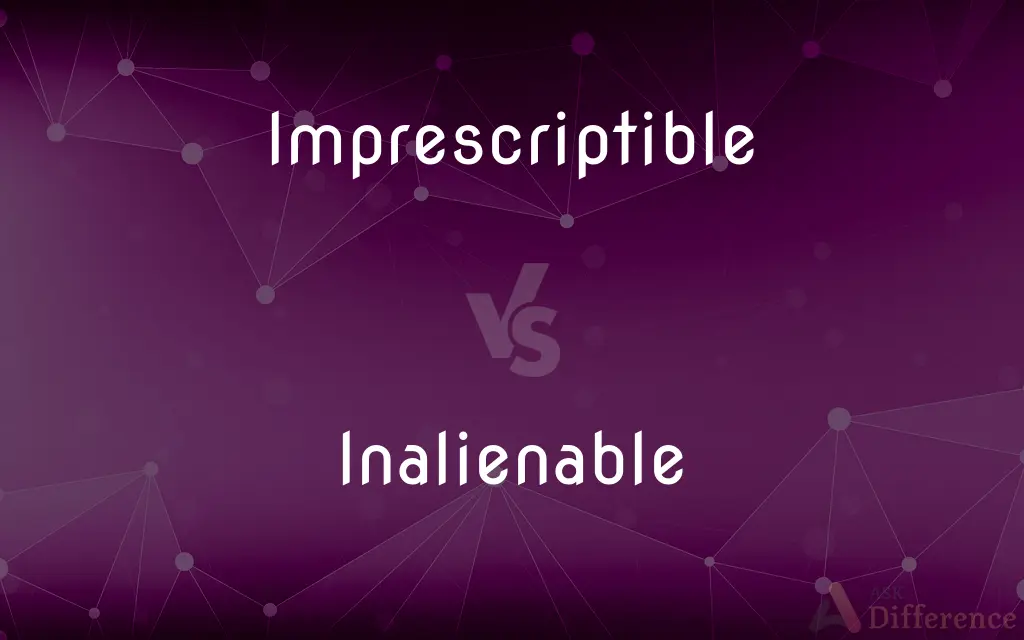Imprescriptible vs. Inalienable — What's the Difference?
Edited by Tayyaba Rehman — By Fiza Rafique — Updated on March 28, 2024
Imprescriptible rights are those that cannot be lost through the passage of time, while inalienable rights cannot be taken away or transferred from a person.

Difference Between Imprescriptible and Inalienable
Table of Contents
ADVERTISEMENT
Key Differences
Imprescriptible and inalienable rights are legal and philosophical concepts that protect certain freedoms or claims, but they differ in how and why these protections are applied. Imprescriptible rights emphasize the element of time, indicating that no matter how much time passes, these rights cannot be extinguished. Inalienable rights, on the other hand, focus on the inability to surrender, sell, or transfer these rights, emphasizing the inherent nature of these rights to an individual's dignity and liberty.
The concept of imprescriptibility is often applied in the context of legal rights and claims, suggesting that certain rights have no expiration, regardless of whether they are exercised or claimed within a specific timeframe. This is crucial in areas like crimes against humanity, where the right to justice remains regardless of the time elapsed. In contrast, inalienable rights are foundational to human rights discourse, implying that these rights, such as the right to life, freedom, and pursuit of happiness, are integral to the human condition and cannot be legitimately given up or taken away.
Imprescriptible rights are thus about the durability of rights over time, protecting individuals or entities from losing their rights due to neglect or failure to assert them within a certain period. Inalienable rights are about the non-transferability of certain fundamental rights, rooted in the principle that these rights are so essential to the individual's identity and autonomy that they cannot be transferred or relinquished, even if the individual wishes to do so.
The distinction between the two terms can influence legal and ethical discussions, policies, and practices. For example, when drafting constitutions, international treaties, or laws, understanding whether a right is considered imprescriptible or inalienable can determine how it is protected and enforced. This distinction also shapes debates on human rights, property rights, and the rights of indigenous peoples, among other areas.
In summary, while both imprescriptible and inalienable rights serve to protect fundamental aspects of freedom and dignity, they operate on different principles. Imprescriptible rights resist the erosion of time, ensuring that certain rights remain actionable regardless of temporal constraints. Inalienable rights safeguard the core attributes of human beings that are deemed essential for individual autonomy and dignity, ensuring these rights cannot be forfeited or transferred.
ADVERTISEMENT
Comparison Chart
Definition
Rights that cannot be lost over time
Rights that cannot be taken or given away
Focus
Durability over time
Inherent to individual dignity
Context
Legal claims, justice
Human rights, personal freedoms
Key characteristic
Time resistance
Non-transferability
Application examples
Crimes against humanity, land claims
Right to life, freedom, pursuit of happiness
Compare with Definitions
Imprescriptible
Not subject to being lost through lapse of time.
The right to prosecute genocide is imprescriptible.
Inalienable
Unable to be taken away from or given away by the possessor.
Freedom of speech is an inalienable right.
Imprescriptible
Rights that remain despite inaction.
Certain land rights are imprescriptible, surviving through generations.
Inalienable
Core to democratic principles.
The inalienable right to vote underpins democratic societies.
Imprescriptible
Protects against the erosion of claims over time.
The imprescriptible nature of the claim ensures it can always be brought forward.
Inalienable
Fundamental to the human condition.
The declaration stated that liberty is an inalienable right.
Imprescriptible
Pertains to legal and moral rights.
Victims’ rights to justice are often considered imprescriptible.
Inalienable
Not transferable or renounceable.
Inalienable rights remain with the individual from birth to death.
Imprescriptible
Focuses on longevity and permanence.
Imprescriptible rights to cultural heritage protect it for future generations.
Inalienable
Integral to personal autonomy.
Autonomy over one's body is considered an inalienable right.
Imprescriptible
Not subject to prescription: absolute, inalienable.
Inalienable
That cannot be transferred to another or others
Inalienable rights.
Imprescriptible
Not capable of being lost or impaired by neglect, by disuse, or by the claims of another founded on prescription; - of rights.
The right of navigation, fishing, and others that may be exercised on the sea, belonging to the right of mere ability, are imprescriptible.
Inalienable
Incapable of being alienated, surrendered, or transferred to another; not alienable.
An inalienable right is a right that cannot be given away
Imprescriptible
Not derived from, or dependent on, external authority; self-evidencing; obvious.
The imprescriptible laws of the pure reason.
Inalienable
(grammar) Of or pertaining to a noun belonging to a special class in which the possessive construction differs from the norm, especially for particular familial relationships and body parts.
Inalienable
Incapable of being alienated, surrendered, or transferred to another; not alienable; as, in inalienable birthright.
Inalienable
Incapable of being repudiated or transferred to another;
Endowed by their Creator with certain unalienable rights
Inalienable
Not subject to forfeiture;
An unforfeitable right
Common Curiosities
Can inalienable rights ever be restricted?
While inalienable rights are fundamental, they may be subject to certain limitations under specific circumstances, such as during a state of emergency, but such restrictions are closely scrutinized for necessity, legality, and proportionality.
Why are imprescriptible rights important in international law?
They ensure that certain crimes or rights violations cannot be ignored or dismissed due to the passage of time, emphasizing the enduring demand for justice and accountability.
Can a right be both imprescriptible and inalienable?
Yes, some rights, like the right to not be subjected to torture, can be considered both imprescriptible and inalienable due to their fundamental nature and the principle that they should not be lost over time or relinquished.
Can inalienable rights be waived or given up voluntarily?
By definition, inalienable rights cannot be voluntarily given up or transferred, as they are considered essential to the individual's autonomy and dignity.
What makes a right inalienable?
A right is considered inalienable if it is essential to the dignity, freedom, and ethical integrity of the individual, such that its removal or transfer would fundamentally violate human rights principles.
Are property rights imprescriptible or inalienable?
Property rights are generally neither imprescriptible nor inalienable; they can expire over time (e.g., through adverse possession) and can be transferred or relinquished by the owner.
What challenges exist in protecting imprescriptible rights?
Challenges include ensuring that legal systems recognize and enforce these rights across time, often requiring international cooperation and consistent judicial frameworks.
How are imprescriptible rights enforced?
Through legal frameworks and international agreements that acknowledge and protect these rights, ensuring that claims and justice are not barred by the passage of time.
How do societies benefit from recognizing inalienable rights?
Recognizing inalienable rights helps protect individual dignity and freedom, fostering environments where human potential and creativity can flourish within a framework of mutual respect and legal protection.
How do imprescriptible and inalienable rights interact?
While they operate on different principles, both sets of rights interact to form a comprehensive framework for protecting human dignity, freedom, and justice, often reinforcing each other in legal and ethical dimensions.
Share Your Discovery

Previous Comparison
Purportedly vs. Supposedly
Next Comparison
Sirocco vs. SimoomAuthor Spotlight
Written by
Fiza RafiqueFiza Rafique is a skilled content writer at AskDifference.com, where she meticulously refines and enhances written pieces. Drawing from her vast editorial expertise, Fiza ensures clarity, accuracy, and precision in every article. Passionate about language, she continually seeks to elevate the quality of content for readers worldwide.
Edited by
Tayyaba RehmanTayyaba Rehman is a distinguished writer, currently serving as a primary contributor to askdifference.com. As a researcher in semantics and etymology, Tayyaba's passion for the complexity of languages and their distinctions has found a perfect home on the platform. Tayyaba delves into the intricacies of language, distinguishing between commonly confused words and phrases, thereby providing clarity for readers worldwide.
















































